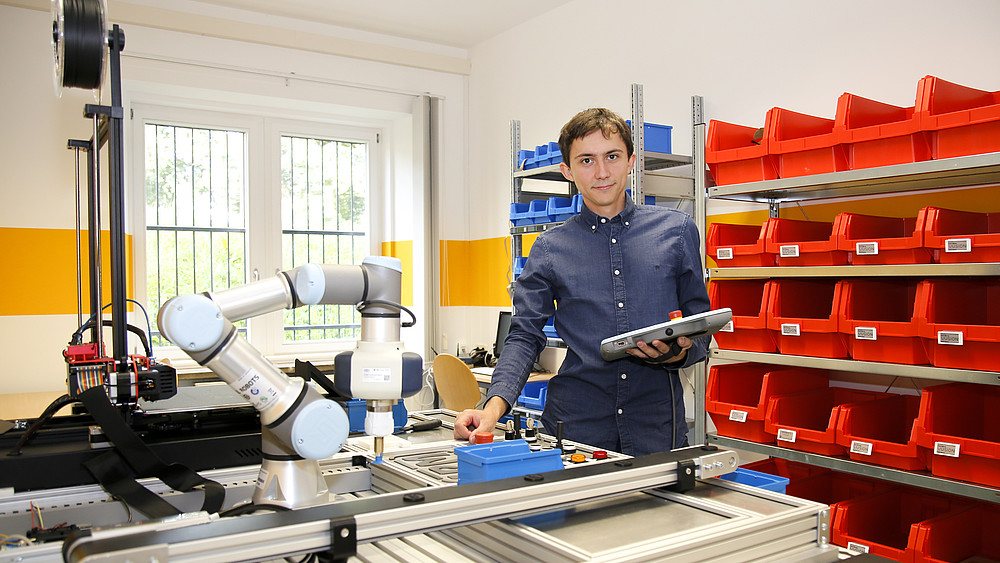Graduate interview with Valentin Reinhardt from the KIA degree program "Automation and Mechatronics".

Valentin Reinhardt studied "Automation and Mechatronics" on the KIA course at our university and graduated this year. In this interview, he not only talks about his studies at the HSZG, but also about his experiences as a helper in the flood area.
This year you completed your studies on the KIA "Automation and Mechatronics" course with your diploma thesis. How did you come to choose this course in Zittau?
I was looking for a course where I could gain practical experience. That's why I very quickly came across the Zittau/Görlitz University of Applied Sciences, because I could study there with integrated training. I then applied to many companies in Leipzig and this is how I found my trade company, where I did my training as an electrician. The company agreed to allow me to train as part of a KIA course. That's how I ended up in Zittau.
You wrote your thesis on the topic of "Design and implementation of a production-related human-robot application". What exactly did you work on?
I created a system that connects a 3D printer and a person. The 3D printer prints a component that can be automatically removed by a robot and the human only acts as a control point in a fixture. After the inspection, the human places the component in another holder and positions it. The robot then automatically removes the components and places them on the conveyor belt. So it's basically a logistics application.
Was working on your diploma made more difficult by the pandemic?
In fact, I wasn't restricted in my work at all because I was allowed to use a laboratory at the Institute of Process Engineering, Process Automation and Metrology (IPM ). I didn't experience any serious restrictions there. I was usually alone or in pairs in the lab, the distances were kept and I had enough freedom to do everything. Contact with my supervisors also worked very well. If I had a request, I could simply drop by the office in person, write an email or give them a quick call. Everyone was quickly available.
During your thesis, you didn't just concentrate on your topic, you were also in the flood area as part of your work with the volunteer fire department. How did you provide support on site, in addition to your work?
I had already worked so well on my dissertation that a week of work didn't set me back. That's why I went to Rech in the Ahr valley. As the fire department, we first had to set up the general incident command, and the German Armed Forces and THW were already on site. The entire town had been torn away, you've rarely seen such a field of rubble. We helped to pump out the cellars, remove the mud from the cellars and clean the streets. We also had to be very careful, because most of the cellars contained heating oil tanks and the mud was contaminated accordingly. There was no water and electricity was only available from the emergency generators. Houses were torn down and roads destroyed - a huge water hole had even formed in the middle of the village. Due to my current job, I'm completely tied up and often on site, otherwise I would have liked to go there again to help.
You will soon be working for an engineering company in Leipzig. What tasks await you there?
At the moment I'm still working as an electrician on site. At my new engineering company, I will then be entrusted with industrial plant planning. I will then develop the electrical planning and even the control technology. I'll know more details when I start in October.
You completed your degree very well in Zittau. How will you remember your studies at the HSZG?
There are big differences between a university and a college. At the HSZG I wasn't just a number, it was the people behind it that counted and I could talk to everyone. It feels like one big family. When problems arise, everyone gets help everywhere and doesn't have to go looking for it. Furthermore, the rents in Zittau are quite cheap, so it's even worth having your own apartment. Zittau and its surroundings have a lot to offer. I enjoyed hiking and exploring everything, the distance to Poland and the Czech Republic is very short. Last year, for example, I went on a weekend trip to the Giant Mountains with fellow students. The HSZG offers an all-round package of a family atmosphere, helpfulness and a great environment.
The interview was conducted by Hanna Maiwald, University Development and Communication Office.